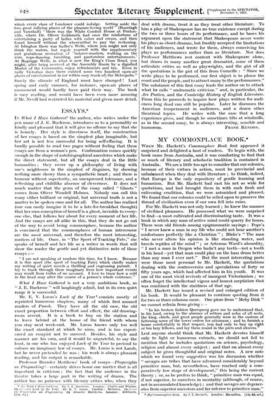.ESSAYS.*
Ix What I Have Gathered' the author, who writes under the pen name of J. E. Buckrose, introduces us to a personality so kindly and pleasant that it will give no offence to say that she is homely. Her style is directness itself, the construction of her essays is based on the simplest plan imaginable, but her 'art is not less successful for being self-effacing. It is hardly possible to read two pages without feeling that these essays are from a woman's pen. Confirmation comes quickly enough in the shape of autobiographical anecdotes which make the direct statement, but all the essays deal in the little humanities ; they cover up a philosophy of living with one's neighbours in the simplest of disguises, by showing nothing more showy than a sympathetic heart ; and there is
humour without superiority, an unexpressed tolerance, and a refreshing and childlike absence of cleverness. It does not much matter that the germ of the essay called " Ghosts " comes from Oliver Wendell Holmes. Nobody can call this essay either brilliant or original, but universal truth is not a matter to be spoken once and for all. The author has realized (one can easily imagine it to be a late-for-breakfast thought) that her own conception of herself is a ghost, invisible to every- one else, that follows her about for every moment of her life. And the essays are all alike in this, that they do not go out of the way to avoid being commonplace, because the author is convinced that the commonplaces of human intercourse arc the most universal, and therefore the most interesting, matters of life. Once, in " The Sport of Tracking Fate," she speaks of herself and her life as a writer in words that will show the reader the gentle and yet distinctive note of these essays :— " I am not speaking at random this time, for I know. Because it is this sport (the sport of tracking Fate) which chiefly makes my writing of quiet novels a thrilling and engrossing pursuit. I try to track through these imaginary lives how important events may result from trifles of no account. I love to trace how a cold in the head may alter the course of a person's whole existence."
. What I Have Gathered is not a very ambitious book, as
" J. E. Buckrose " will laughingly admit, but in its own quiet range it is successful.
. Mr. E. V. Lucas's Luck of the Year 2 consists mostly of reprinted humorous chapters, many of which first amused readers of Punch. They have all the old ease, the old
exact proportion between effort and effect, the old drawing- room accent. It is a book to buy on the station and to leave behind at the house of the friend with whom you stay next week-end. Mr. Lucas knows only too well
the exact standard at which he aims, and is too experi- enced an essayist not to succeed. Besides, his style and manner are his own, and it would be ungrateful, to say the least, in one who has enjoyed Luck of the Year to pretend to
enforce an imaginary law of essays. Mr. Lucas is not Lamb, but he never pretended he was ; his work is always pleasant reading, and his output is remarkable.
Professor Brander Matthews' book of essays—Playwrights on Playmaking"—certainly drives home one matter that is all important in criticism : the fact that the audience in the
theatre takes a large part in the writing of drama. The author has no patience with literary critics who, when they
• (I) Wind I Hare Gathered. By J. E. Bnekrose. Loudon : Chatto and Windus. Se.1—(2) Luck of the Year. - E. V. Lueas. London: Methuen. [6s.]-- (3) l'tayarrialds m Playntakinj. By Brander Matthews. London Setibners. (10a. W.)
deal with drama, treat it as they treat other literature. To him a play of Shakespeare has no true existence except during
the two or three hours of its performance, and he bases his argument upon the statement that Shakespeare never wrote his plays as closet-dramas, but frankly accepted the limitations of his audiences, and wrote for them, always conceiving his plays as performances rather than as literature. Nor does Professor Matthews rest content with Shakespeare alone, but draws in many another great dramatist, some of them articulate critics as well as playwrights, and the gist of all the quotations is the gist of this from Corneille : " Since we write plays to be performed, our first object is to please the court and the people, and to attract many to the performances." The substance of this first essay leads the author on to attack what he calls " undramatic criticism " and, in particular, the Ars Poetica, and the Cambridge History of English Literature. From this he proceeds to inquire how plays written for audi-
ences long dead can still be popular. Later he discusses the American temperament in audiences, and a dozen other theatrical topics. He writes with the ease that a long experience gives, and though he sometimes tilts at windmills, as in the second essay, he is always interesting, sensible and


























































 Previous page
Previous page